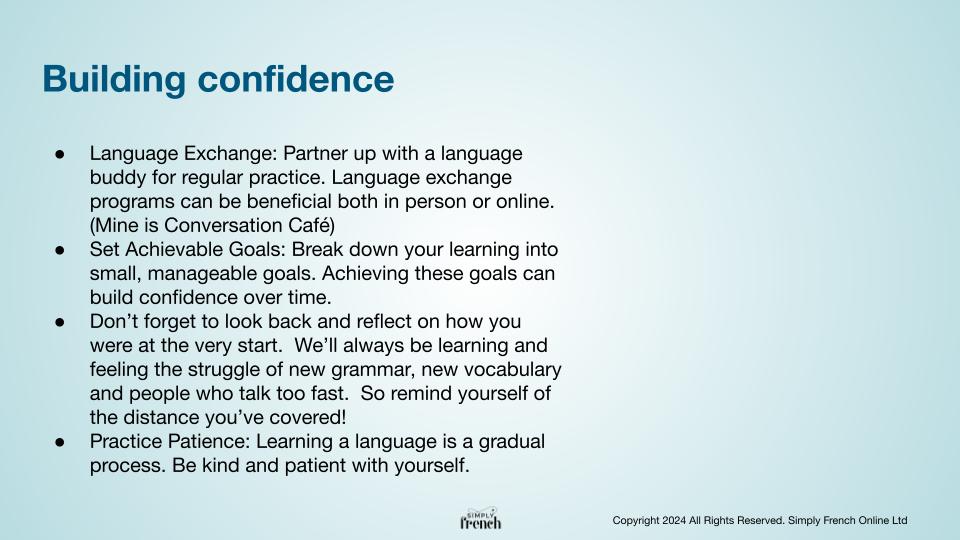Take the reins of the conversation
Nov 18, 2024Do you have the confidence to join in with a French conversation? Are you able to gently interrupt or do you stand on the sidelines with Brain Freeze, wishing you could recall the words you need?
Does the conversation race away without you, leaving you behind?
Believe me, it’s not just how much you know, but HOW you manage the conversation that is important.
Find out how to take the reins of the conversation and stay a part of it even if you’re a beginner.
In this mini-lesson, you will discover:
- How to negotiate a productive conversation and not be left on the sidelines
- Useful vocabulary to manage that + how to pronounce it
- How to build your confidence
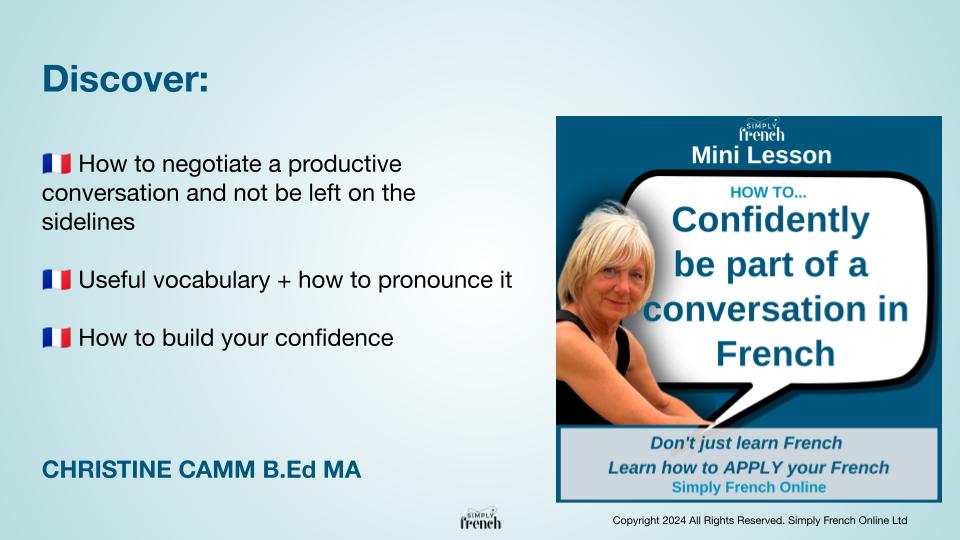
How to negotiate a productive conversation and not be left on the sidelines
I am guessing that you started to learn French in order to have proper conversations. Maybe, you are afraid to express yourself because you lack of confidence?
You are at the right place. I want to help you and share with you all what I learnt to gain confidence and be able to speak French.
Here are the essential points to take the reins of the conversation:
- Preparation and practice
- Learn Polite Interruption Phrases
- Negociate a Supportive Environment
- Techniques for Active Conversations
- Building Confidence
- Use Resources

Preparation and practice.
First, if you want to have a productive conversation, you need some vocabulary and basic phrases.
What do I mean? Well, if you know some simple common phrases and vocabulary like greetings, introductions, and polite requests, you’ll be able to build your confidence.
Once you have this, you want to practice. How can you achieve this? In order to develop your production skills, role-playing is key. In addition, you need to improve your listening practice.
What are role-plays and why they are crucial for you?
To start with, a role-play is an imitation of reality. Imagine a context and practice the conversation based on this chosen context.
For instance, you are at the reception of a hotel and need to book a room. Or you want to make an appointment with the dentist.
Simulate conversations in a safe environment. The more you do it, the more natural it will be in real situations.
Role-play different scenarios to get comfortable with real-life interactions.
How can you improve your listening skills? It’s ok at times to just listen to French conversations through easy podcasts, videos, or language apps. This helps improve comprehension and familiarity with natural speech patterns.
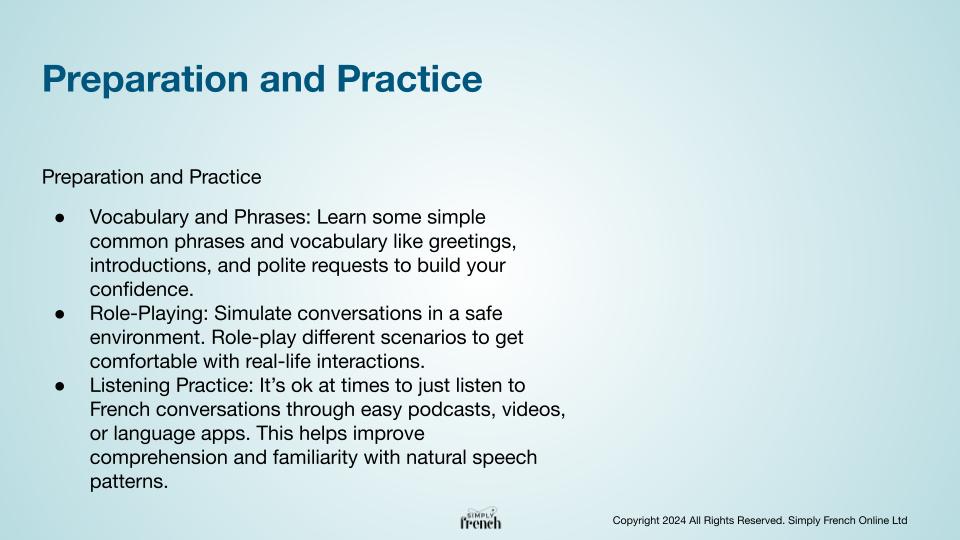
Learn Polite Interruption Phrases
Now get ready to join in and equip yourself with common polite phrases used to interrupt in French. We are brought up to wait for a pause in the conversation. A pause is usually a good time to interject. But we need to get used to interrupting. If you let someone rattle on for 5 sentences and you zone out, you can’t learn from it. You’re letting them generate a monologue as you’re not involved and it’s disheartening for both people.
Stop them at the first sentence - be pro-active. Indeed, it reinforces that you care to understand and respond! Here are useful sentences for you:
- Excusez-moi >>> Excuse me
- Pardon >>> Pardon
- Puis-je dire quelque chose? >>> May I say something?
- Une petite question >>> A quick question
- Je suis désolé(e) de vous couper la parole >>> I’m sorry to interrupt.
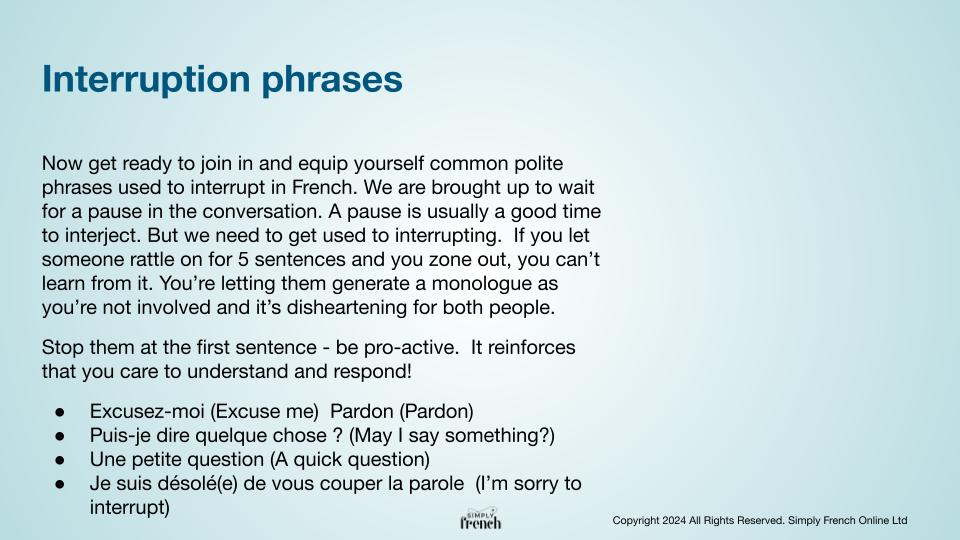
Negotiate a Supportive Environment
It's okay to make mistakes. Participation is more important than perfection.
Ask for a slow and clear speech like this:
- Je voudrais comprendre. >>> I’d like to understand.
- Doucement, s’il vous plaït. >>> Slowly, please.
If you add why, you connect more with the person. They get what you want.
Positive Reinforcement: Celebrate your efforts and progress, no matter how small. Do this by checking you have understood: “Si j’ai bien compris . . . (Don’t eat all the cake!)
It’s ok for the conversation to be short at the start. You’re a beginner so in the confirmation stage there it’s a great learning opportunity.
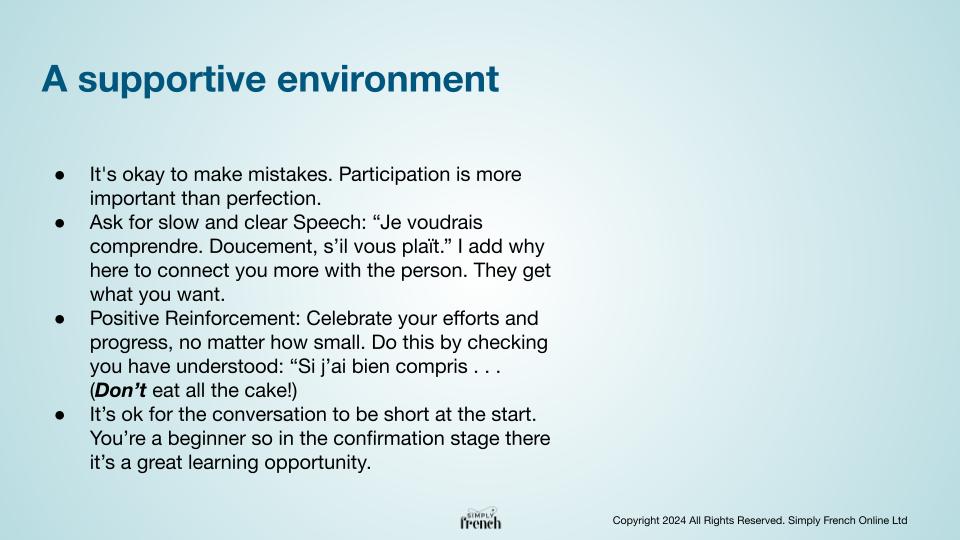
Techniques for Active Conversations
Time to share with you some tips so you can have (inter)active conversations.
First, ask open-ended questions. What are they?
They are questions that require more than a yes/no answer, hence they encourage people to speak more. This gives you a learning opportunity. Repeat new words carefully to get used to them.
Then, use gestures and visual aids. Indeed, non-verbal cues can aid understanding and help people talking to you know when you need help!
Raise a hand, put on that “HELP” face!
Less is more. Simplify your language.
For instance, use simple sentences and avoid complex structures or idiomatic expressions initially.
Finally, avoid translating all the time - it slows you down - if you understand, don’t repeat in English.
Acknowledge you’ve understood with a nod, or a simple agreement comment.
- Mais oui ! >>> Of course!
- Ah bon ? >>> Really?
- Tout à fait ! >>> Sure!
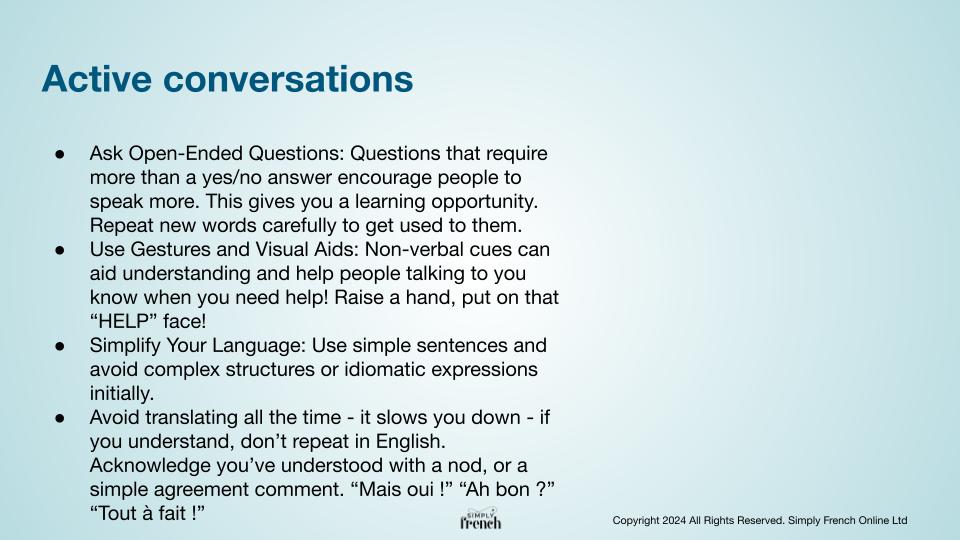
Building Confidence
How can you build your confidence and converse naturally?
What about a language exchange?
Partner up with a language buddy for regular practice. Language exchange programs can be beneficial both in person or online. (Mine is Conversation Café)
Set Achievable Goals: Break down your learning into small, manageable goals. Achieving these goals can build confidence over time.
Don’t forget to look back and reflect on how you were at the very start. We’ll always be learning and feeling the struggle of new grammar, new vocabulary, and people who talk too fast. So remind yourself of the distance you’ve covered!
Do you practise patience? Learning a language is a gradual process. Be kind and patient with yourself.
Use Resources
We all learn differently. What is your learning style? Are you a visual learner? Auditory one? Or maybe you need to move while learning?
My best advice is to combine various types of resources.
You could take advantage of language apps.
Tools like AI, Duolingo, Babbel, or Rosetta Stone can provide structured learning and practice. Mine is the French Language Accelerator course for revising your school French and getting speaking.
Flashcards make wonders for visual learners. Use flashcards for vocabulary building and quick review. I use post-it notes all over the place and move them around to reinforce the words. Then I get creative with them.
People are a great resource. Join French-speaking groups or clubs where you can practise in an encouraging social setting. Eg, I do an in-person Conversation Café in my local town and have 8 online groups of different levels for those who don’t have local access to French speakers on a regular basis..
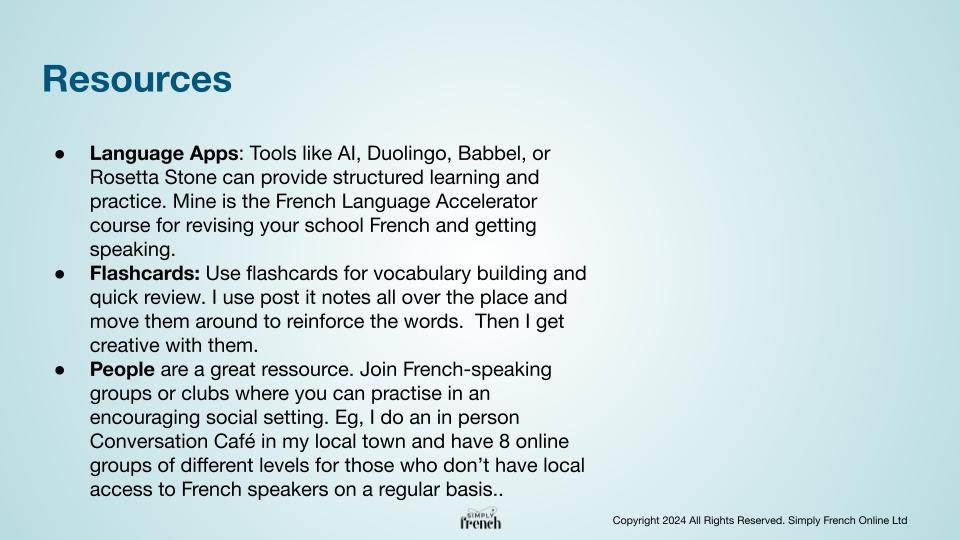
Be active and take the reins of the conversation.
Speaking another language requires courage. Action will give you the confidence to speak French.
Do all you can to have a safe environment where you are not afraid to make mistakes.
If you have the tools, the confidence and know how to have active conversations, you will start talking and improve each time.
Simply remind yourself that you are brave and you should enjoy your learning as much as possible. Be kind to yourself and embrace mistakes.
Here are some other mini-lessons to help you with your speaking skills:
How to overcome perfectionism in French and avoid pain
French Enchainment Pronunciation
What are your biggest challenges when it comes to expressing yourself in French?
Free Masterclass
Learn my 4 step method of how to hold meaningful french conversations the R.E.A.L. way in just 30 minutes a day.
When you signup, we'll be sending you weekly emails with additional free content

